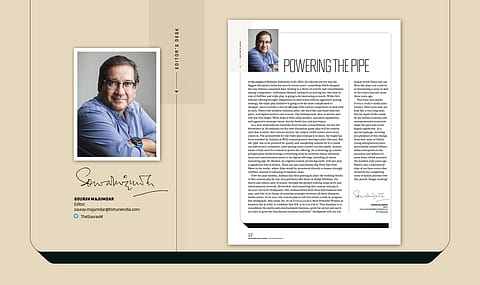Powering the Jio pipe
Editor’s letter from the October 2019 edition.

If the launch of Reliance Industries Ltd’s (RIL) Jio telecom service was the biggest disruption India has seen in recent years—something which changed the way Indians consumed data, leading to a flurry of activity and consolidation among competitors—billionaire Mukesh Ambani’s second big bet, this time by way of JioFiber and triple play, is going to be interesting to watch. While Jio’s telecom offering brought competitors to their knees with its aggressive pricing strategy, the triple play initiative is going to be far more complicated to navigate, since it entails a mix of offerings with various competitors to deal with in each. There’s the mobility solutions piece, the fixed line and home Internet piece, and digital services and content. The battleground, then, is diverse and will test Jio’s might. What helps is RIL’s deep pockets, execution capabilities, and aggressive strategic intent, but the battle has only just begun.
At a time when telecom networks have become commoditised, the key differentiator as Jio embarks on this new disruption game plan will be content. And that is where Jio’s content factory, the subject of this issue’s cover story, comes in. The groundwork for the triple play strategy is in place, the bugle has been sounded by Ambani at RIL’s annual general meeting earlier this year. But the ‘pipe’ has to be powered by quality and compelling content for it to stand out and attract consumers, since pricing alone cannot win this battle. Acutely aware of this need for content to power the offering, Jio is drawing up a multi-pronged plan which leverages everything from its powerful linear television news and entertainment assets to its digital offerings, including its music streaming app. Jio Studios, its original content producing outfit, will also play a significant role in all this. There are also innovations like First Day First Show in the works, where films would be premiered directly to homes through JioFiber, instead of releasing in theatres alone.
Over the past months, Ambani has been putting in place the building blocks of this content play by way of acquisitions like those in Balaji Telefilms, JioSaavn and others, and, of course, through the group’s existing mega news and entertainment network, Network18. And anchoring this content strategy is 48-year-old Jyoti Deshpande, who Ambani hired from Eros International last year, and who is in charge of ensuring synergies between all these disparate media assets. To be sure, the content play is still very much a work in progress, but Deshpande, who ranks No. 18 on Fortune India’s Most Powerful Women in business list in 2019, is confident that RIL is in it to win it. “Our mandate is to consolidate the media and entertainment business, grow the sector and use it as a fuel to grow the distribution business multifold,” Deshpande tells my colleague Aveek Datta and me. How this plays out could be as fascinating a story as that of Jio’s entry into the scene three years ago.
This issue also marks Fortune India’s ninth anniversary. Nine years may not look like a very long time, but the rapid strides made by the Indian economy and entrepreneurial ecosystem make the past nine years hugely significant. In a special package, we bring you glimpses of this change, from how some of India’s young entrepreneurs have successfully created billion-dollar enterprises to the successes and failures of some firms which accessed the markets nine years ago. There’s also a selection of nine of our best covers that chronicle the compelling story of India’s journey over this period. Happy reading!
Issue on stands, and on Amazon: https://amzn.to/2m9FpOQ